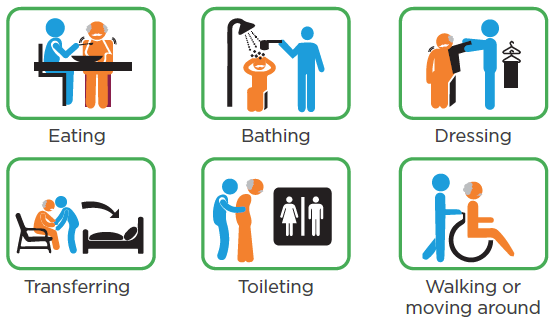Over 70% of seniors aged 65 years today will need some form of Long-Term Care during their lifetime. Whether it be in the home or at a skilled nursing facility, care is expensive. Costs for Long-Term Care are the number one threat to a senior’s financial security.
Medicaid is a great resource for paying for Long-Term Care, but the rules are complex and change frequently. The following lists the current Medicaid standards for Washington residents as of January 2019, and explains in more detail how you qualify.
Medicaid is Not Medicare
To clarify, Medicare is a government health insurance granted to citizens of the United States once they turn 65 years old or to disabled persons under the age of 65. Medicaid is a needs-based program available to people of any age and is the primary payer of Long-Term Care expenses. Medicare pays only for short-term rehabilitation and not on-going Long-Term Care.
Criteria
There are two main criteria that one has to meet in order to qualify for Medicaid Long-Term Care benefits. There must be a medical need, and a financial need.
Medical Need
To get assistance paying for care, you must be in need of care. You would need assistance with at least two “activities of daily living” (see the chart below), medication management, or you have cognitive impairment.

Financial Need
To see if a person meets financial requirements, the state looks at both income and assets. As a general rule, your monthly income must be less than the cost of your care. Where Medicaid’s rules get more complicated is with assets.
Assets
Countable assets are what you’d consider as money, such as:
- Bank Accounts
- 401K Retirement Accounts
- ROTH or IRA accounts
- Stocks and Bonds
- Trusts
Non-countable assets include your house, your personal items (furniture, appliances, jewelry, etc.), and one car. Any additional real estate or vehicles are generally countable under Medicaid’s rules.
Medicaid Standards
As of January 2019, a couple in the state of Washington is allowed to have a minimum of $55,547 up to $126,420 in countable assets and qualify for Medicaid. The larger figure depends on the date one spouse is institutionalized, the level of care needed, and the couple’s total resources at that time. For more information, please go to the Washington Apple Health website.
However, a single person can only have $2,000 in countable assets. The reason couples can have more is that the state has a policy against impoverishing the well spouse.
If a person or couple has assets that exceed these figures, they may be tempted to “spend down” or give their money away in order to protect it and qualify for benefits. This is a bad idea because of another Medicaid rule known as the “five-year look back”.
The Five-Year Lookback
As Medicaid examines your income and asset level, they will also look at your spending for the five years prior to your application. This includes monetary gifts or gifts of real estate. For every “gift” that you make of $9,829 there is a penalty period of one month where Medicaid will not pay for your care. For example, if you are single with $100,000 and attempt to give away $98,290, you would have to wait 10 months before Medicaid will pay for your care. It’s because of this penalty that it’s important to be careful with what you do with your money. Do not give it away!
The State’s Lien
Once you qualify for Medicaid, the state has rights to recoup the costs of your care after your death through a lien or a claim of estate recovery.
There are some exceptions to these rules and other asset saving strategies that we will discuss in our next article “Protecting Assets and Qualifying for Medicaid”.
Medicaid standards change frequently, so check with an Elder Law Attorney whose practice focuses on Medicaid to get the most up to date information. Occasionally you’ll hear of assisted living or skilled nursing facilities offering to fill out Medicaid applications. THIS IS A BAD IDEA. You risk losing the opportunity to protect assets from that state’s lien. An Elder Law Attorney will also be able to recommend strategies that can help you protect your home, and your assets.
For help with Medicaid applications or other Estate Planning needs, call Elder Law Group at (509) 468-0551 and schedule a consultation with our experienced legal team.


